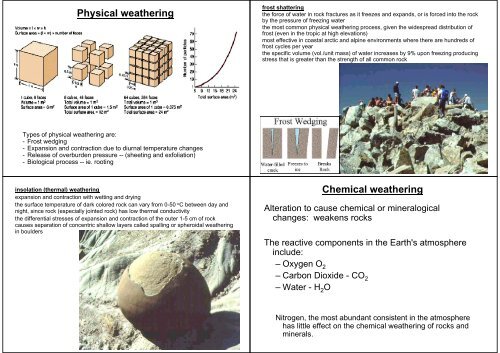Chemical Weathering and Soil Development
Chemical Weathering and Soil Development
Chemical Weathering and Soil Development
You also want an ePaper? Increase the reach of your titles
YUMPU automatically turns print PDFs into web optimized ePapers that Google loves.
Physical weathering<br />
Types of physical weathering are:<br />
- Frost wedging<br />
- Expansion <strong>and</strong> contraction due to diurnal temperature changes<br />
- Release of overburden pressure -- (sheeting <strong>and</strong> exfoliation)<br />
- Biological process -- ie. rooting<br />
insolation (thermal) weathering<br />
expansion <strong>and</strong> contraction with wetting <strong>and</strong> drying<br />
the surface temperature of dark colored rock can vary from 0-50 o C between day <strong>and</strong><br />
night, since rock (especially jointed rock) has low thermal conductivity<br />
the differential stresses of expansion <strong>and</strong> contraction of the outer 1-5 cm of rock<br />
causes separation of concentric shallow layers called spalling or spheroidal weathering<br />
in boulders<br />
frost shattering<br />
the force of water in rock fractures as it freezes <strong>and</strong> exp<strong>and</strong>s, or is forced into the rock<br />
by the pressure of freezing water<br />
the most common physical weathering process, given the widespread distribution of<br />
frost (even in the tropic at high elevations)<br />
most effective in coastal arctic <strong>and</strong> alpine environments where there are hundreds of<br />
frost cycles per year<br />
the specific volume (vol./unit mass) of water increases by 9% upon freezing producing<br />
stress that is greater than the strength of all common rock<br />
<strong>Chemical</strong> weathering<br />
Alteration to cause chemical or mineralogical<br />
changes: weakens rocks<br />
The reactive components in the Earth's atmosphere<br />
include:<br />
– Oxygen O 2<br />
– Carbon Dioxide - CO 2<br />
–Water -H 2 O<br />
Nitrogen, the most abundant consistent in the atmosphere<br />
has little effect on the chemical weathering of rocks <strong>and</strong><br />
minerals.


